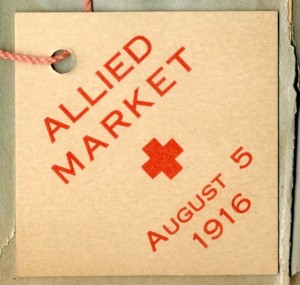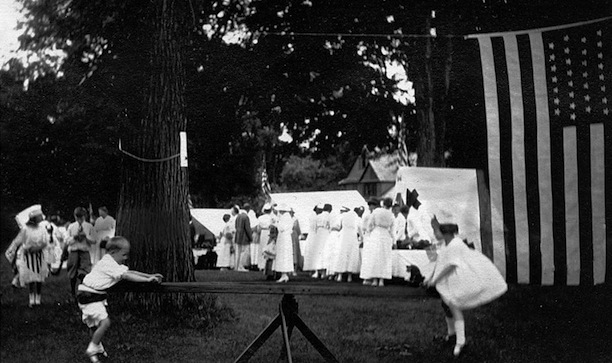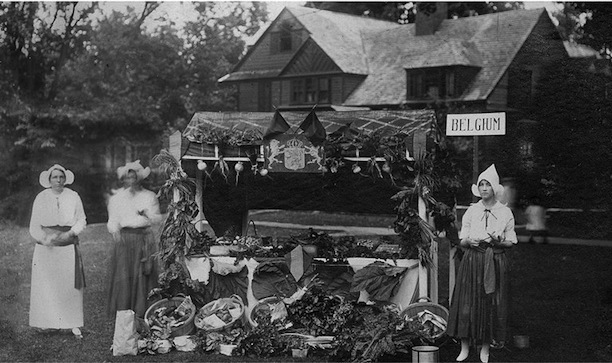Three months after World War I began in Europe, a group of young women living around the town green in Washington, Connecticut, transformed their reading circle into an active society working for the Allies. The chorus of a popular war song, “Sister Susie’s Sewing Shirts for Soldiers” was the inspiration for the name of their new organization.

Ticket for the “Allied Market” held on the Washington Green, August 5, 1916 – From the scrapbook of Anne Walton Johnson of Bridgeport and Washington, CT – Courtesy of David Babington
At first, the women received contributions of money and clothes from Washington inhabitants; but in the spring of 1915, the Society developed a plan to more actively pursue much-needed aid. They held a large card party, encouraged the Congregational Church to take up a special collection to fund the society’s activities, and worked with the Washington Club to put up a box for donations. These efforts enabled the society to buy necessary supplies and to send money to various war relief organizations, including the American Red Cross and the Belgian Relief Fund. In the spring of 1916, the Sister Susie Society even undertook the support of a Belgian war orphan named Daniel Bataille. They maintained this responsibility throughout the war and for several years thereafter.
Washington Residents All Join the Effort
As the war lengthened, the society began meeting at the Washington Club. To increase community engagement, the Sister Susies expanded their membership to include the entire town. The response from Washington residents was enthusiastic and subsequent events raised additional funds. They held an “Allied Market” on August 5, 1916, on the Washington Green and members also sold Christmas cards featuring recipes from each of the Allied nations.
When the United States entered World War I in 1917, the society met the increased demand for aid with additional open meetings and public events. They held a festival known as “The Encampment” on August 16, 1917, and set up tent-covered booths on the green, with the Sister Susies dressed as Red Cross nurses. The entertainment for the event included a presentation by “The Washington Green Home Guard Drill,” an auction of war posters, and various war-related musical numbers and skits. There was a tremendous response to this community effort and the society raised more than $2,000 from the benefit.

“The Encampment,” The Sister Susie Society’s second fundraiser fair on the Washington Green, August 16, 1917 – Gunn Memorial Museum
In total, the Sister Susie Society raised in excess of $3,500 to aid the war effort, with more than $1,000 of that amount donated directly to war relief organizations. In addition, they sent 32,000 surgical dressings overseas, as well as 600 refugee garments and 600 knitted articles. After the signing of the armistice in November of 1918, the society gave their remaining funds ($371.22) to the Washington Visiting Nursing Association.
This article was originally researched and written by Karen A. Stansbury for the Gunn Memorial Museum in Washington, Connecticut, for their exhibit, “Over There: Washington and the Great War.”









